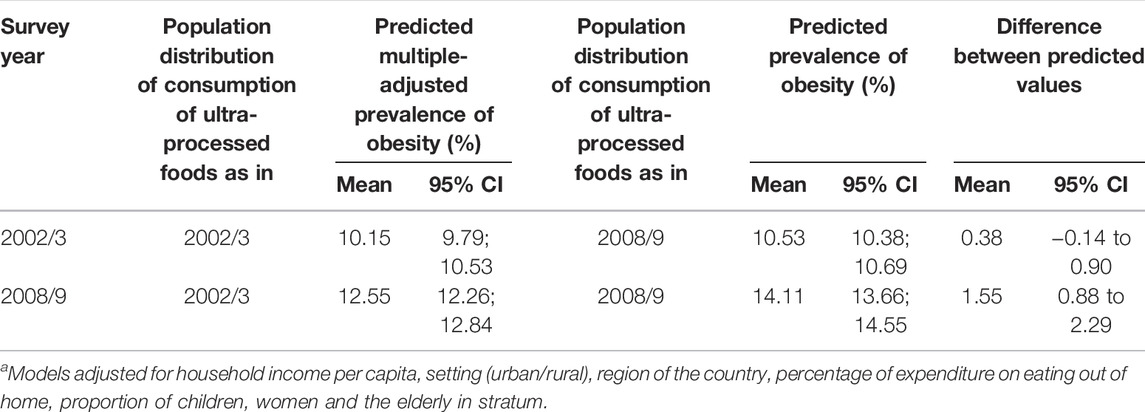- 1School of Public Health, University of São Paulo, São Paulo, Brazil
- 2Center for Epidemiological Research in Nutrition and Health, School of Public Health, University of São Paulo, São Paulo, Brazil
- 3Departamento de Medicina Preventiva, Escola Paulista de Medicina, Universidade Federal de São Paulo, São Paulo, Brazil
- 4Faculty of Medicine, University of São Paulo, São Paulo, Brazil
A Corrigendum on
Changes in Obesity Prevalence Attributable to Ultra-Processed Food Consumption in Brazil Between 2002 and 2009
by Louzada ML, Steele EM, Rezende LFM, Levy RB and Monteiro CA (2022). Int J Public Health 67:1604103. doi: 10.3389/ijph.2022.1604103
In the original article, there was a mistake in Table 3 as published. The 95% CI in the last column is “0.88 to 2.29” and not “0.33 to 1.59”. The corrected Table 3 appears below.

TABLE 3. Prevalence of obesity predicted from two multiple-adjusted linear regression modelsa according to alternative scenarios regarding the consumption of ultra-processed foods. Brazilian households strata in 2002/3 (n = 443) and 2008/9 (n = 550).
The authors apologize for this error and state that this does not change the scientific conclusions of the article in any way. The original article has been updated.
Keywords: obesity, Brazil, ultra-processed foods, population attributable fraction, epidemiology, nutrition surveys
Citation: Louzada ML, Steele EM, Rezende LFM, Levy RB and Monteiro CA (2022) Corrigendum: Changes in Obesity Prevalence Attributable to Ultra-Processed Food Consumption in Brazil Between 2002 and 2009. Int J Public Health 67:1605178. doi: 10.3389/ijph.2022.1605178
Received: 30 June 2022; Accepted: 13 July 2022;
Published: 08 August 2022.
Copyright © 2022 Louzada, Steele, Rezende, Levy and Monteiro. This is an open-access article distributed under the terms of the Creative Commons Attribution License (CC BY). The use, distribution or reproduction in other forums is permitted, provided the original author(s) and the copyright owner(s) are credited and that the original publication in this journal is cited, in accordance with accepted academic practice. No use, distribution or reproduction is permitted which does not comply with these terms.
*Correspondence: Maria Laura Louzada, bWFyaWEubGF1cmEubG91emFkYUB1c3AuYnI=
This Correction is part of the IJPH Special Issue “Food as a Public Health Issue.”
 Maria Laura Louzada
Maria Laura Louzada Eurídice Martinez Steele2
Eurídice Martinez Steele2